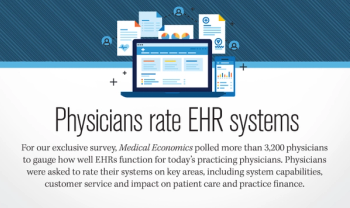
The stated goal of many price transparency companies is to use claims data to better predict the consumer's negotiated rate.

The stated goal of many price transparency companies is to use claims data to better predict the consumer's negotiated rate.

The conundrum for physicians is how they can express their humanity in this situation without incurring the risk of the patient subsequently attempting to use the physician's statement as evidence of malpractice in a lawsuit.

During the good old days, physicians were considered the pillar of the community and the role of primary care physician (PCP) was a respected position. I'm guessing that during that time, we, the physicians, assumed the role of custodians of patients’ medical records.


Finding an EHR designed solely for improving patient care remains a source of simmering frustration, judging by the results of the Medical Economics 2017 EHR Report.

More than eight years and $27 billion dollars later, electronic health records (EHRs) can at best be called a moderate success.

Physicians changing systems due to mix of dissatisfaction and requirements of new employers

The debate between active investment strategies, meaning hands-on investing with a portfolio manager’s help to beat the market, and passive investment, holding onto securities through the market’s ups and downs, is unlikely to subside any time soon.

Physicians offer tips to prevent the EHR from becoming a barrier to meaningful interactions

Patients are accustomed to texting in all facets of their lives and those habits carry over into their relationship with their doctor.

In most states, non-compete covenants in physician contracts are enforceable if they are reasonable in their scope and duration.

Minimize or eliminate EHR frustration by dedicating a “superuser” in the practice.

When the HITECH Act was passed and implemented throughout the healthcare industry, the architects of the law had good intentions.

You have to admire Dr. Conway's childlike beliefs. Santa Claus, the Easter Bunny and one standard format for sharing electronic health data.

Finding an EHR designed solely for improving patient care remains a source of simmering frustration, judging by the results of the Medical Economics 2017 EHR Report.

Finding an EHR designed solely for improving patient care remains a source of simmering frustration, judging by the results of the Medical Economics 2017 EHR Report.

Finding an EHR designed solely for improving patient care remains a source of simmering frustration, judging by the results of the Medical Economics 2017 EHR Report.

We asked primary care physicians from around the country what their top gripes with patients have been, and their answers may surprise you-or relate to you wholeheartedly. Read on to find out what they had to say.

Electronic health records (EHRs) now are a part of most medical practices, yet doctors remain unhappy with them. In the Medical Economics 2017 EHR report-our fifth-we let them explain why in their own words.

Unfortunately, the federal government has pulled the pin and tossed it into the exam room, resulting in an explosion of inefficiency and a disruption in patient care and communication.

How should we be addressing the broader issue of population health?

With thoughtful improvements to how technology is employed and measured, physicians can return to the joy of practice.

How one physician turned his recovery from burnout into a leadership program that’s shifted the culture in his medical system.

Smartphones are transforming professional conversations.

Do you know what treatments your patients would want if they became seriously or even terminally ill?

Let us all remember when the pen hits the prescription pad to write for an opioid that heroin is an opioid, too.

Direct-acting antiviral therapy with sofosbuvir-based combinations safely and effectively treats HCV infection in patients with early-stage chronic kidney disease.

A new study suggests a public health approach is necessary to control the spread of hepatitis C virus in urban communities.

Imagine if you could administer an entire vaccine series in just one shot. That technology might be on the horizon, thanks to researchers at MIT.